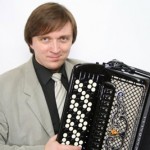 The Russian accordionist Alexander Selivanov is a respected musician all over the world. He has reached important goals with both solo concerts and Una Sinistra duo with Yulia Americova. Today Selivanov is a teacher who focuses on technique and feelings and a valued player busy with his Russian tour till April and then in a very special project with the Italian musician Mirco Patarini.
The Russian accordionist Alexander Selivanov is a respected musician all over the world. He has reached important goals with both solo concerts and Una Sinistra duo with Yulia Americova. Today Selivanov is a teacher who focuses on technique and feelings and a valued player busy with his Russian tour till April and then in a very special project with the Italian musician Mirco Patarini.
1. At 19 you had your first concert and just few years later you won the Coupe Mondiale! How did your life change?
Before my first concert at 19 I had long history of accordion studying and many concerts and competitions had been happened since I was 7 years old when I started to play accordion. That first SOLO concert was just kind of exam for me after 9 years of local accordion life in small town in the middle of European Russia. Soon after that concert I moved to Moscow to study with professor Semionov at the famous Gnessin academy of music. That was a new period of my life and career and many things changed. The most important one is that I’ve met many people and had very interesting contacts, successfully collaborated with people and groups, orchestras and schools and it had helped me very much to grow as a professional musician. From19 to 25 I’ve studied modern Russian accordion; contemporary, classical and folk bayan music and performance styles. So, nearly all what I do now, started in that period. But after 2004 Coupe Mondiale another new step began: I had to become not only a student but also a teacher.
2. In 2004 you took part to the Coupe Mondiale achieving 1st position while in 2010 you were one of the Judges of the same Competition. Which role has been more difficult to play and why?
I had been preparing myself for many years in order to win Coupe Mondiale while I have had no time to prepare myself to adjudicate in Coupe Mondiale. But soon after I won together with Yulia Amerikova our 1° prize Ensemble at 2008 Coupe Mondiale I came back to the competition as a jury member. I clearly remember that the most difficult think was fighting with myself not to sleep during auditions after such a long trip and changing time zones. I was a very quiet jury member and knew exactly what competitors felt on stage because had experienced the same just the year before. Seriously, being a jury member of accordion competition has always a problem. In competition, like sports championship, winners have to do one hundred per cent basic things: performance clearness, text correctness and rhythm in every single piece. Mistakes mean defeat. But I would like to listen to a musician’s full concert and not just focus on some sad 100% clear winner.
As for final mark I always try to find right balance between technical and musical mistakes and successfully played parts of music. For me it’s also very important when accordion players, at any level and ages, have the opportunity to play with real professional knowledge of musical style, music form, feeling and not only connection of fast speed technic or general musicality. Every single, small, brilliant detail of professional performance is fundamental.
3. You are a great classical music lover but what are your main sources of inspiration?
I think nature, travels and nice people all around. For example “Italia e Italiani, “Italiano Vero”! I like people of your country, Italian nature and history and every time I come back home very much inspired from my Italian tours.
4. What do you think about the future of classical music in the world of accordion? Is the accordion going to be isolated or to integrate with other instruments especially concerning chamber music?
Accordion is not only one style instrument. It has never been isolated from other music arts. If we speak about “classical” way of accordion, we can referrer to different styles, where accordion is popular, such as “light music” and “folk” styles and many of their mixed variants. I perfectly know that classical music and academic style of accordion performance are appreciated by colleagues like professional musicians, pianists, violinists and others and I also know that performance of classical music with accordion are interesting for that specific classical music audience. Of course high level accordionists have to perform classical music and in order to be a well educated classical player a musician should play with no hesitations, sharing feeling and knowledge through all accordion possibilities.
Now I think that we are on the same line with classical symphony musicians, integrating more and more, and I hope next generation of players will follow this way, fixing accordion place on classical stage, playing music which goes from Bach and Mozart to Shostakovich and Stravinsky solo or together with piano, classical wind and strings. I believe that accordion will bring new life to classical music world thanks to its features which no one classical instrument has got: timbres of sound, flexible bellows and large range of notes.
5. Today you are a highly respected musician all over the World but also an International recognized teacher. What do you teach to your students besides technique?
Thanks for this question. For me “technique” means knowledge of music and artist’s personal way of transforming musical skills, such as theory and history of music, philosophy, experience and influence, into the best performance which I hear as a result of traditions, style of each piece and energy of the performance or the contact with the audience. On stage, performers are interesting when they have something to say, maybe something new for people who listen to, or something good, which everybody know but is happy to listen again and again. Of course players have to know specific accordion technique of “pushing right button at right time” but also what they want to say by “pushing buttons”. I believe that every musician has to achieve all musical experience of past generations, 400 years of European music development, and collect experiences of national music from East to West, contemporary music and art. In Russia when a musician has basis of international music, we call him or her “academic” or “classical”. Doesn’t matter he plays classical, folk or jazz music. I try to teach my students to become “academic”.
6. What about teachers and structures in Russian Federation? What are the main differences in learning music between Italy and Russia?
During the Soviet period we had perfect musical education in Russia but now we are loosing that system with pyramid of thousands of children music schools (from 7 to 15 years), hundreds of musical colleges (from 15 to 19) and 1 or 2 university or institute of music in every big town providing 5 years of high school education. Since 1991 we had been loosing this system, step by step, in order to change completely the past Soviet system into European system of musical education. So the main difference is that we had professional education for everybody, from 7 to 23-25 years old, in 3 steps: school, college, institute (conservatory). That System was circled: students learned music theory and practice, starting from school, 1st circle, then developing it at the college, 2nd circle, and finally achieving a complete education at the conservatory, 3d circle. Moreover, till the present time, 99% of students studied free of charge and had small, monthly, donation thanks to scholarships.
7. As for accordion production in Russia, do you think is the situation stable or growing?
I can call stable the very expensive professional models production. But not growing. According to Russian economy, accordion production depends on oil gas prices, Dollars, Euro and State budget. All accordion manufactories survive more comfortable when they have orders from State schools. At the moment I think that the biggest company is “AKKO” in Voronezh city. It produces instruments and has got a very wide selection of models. Two smaller companies in Moscow produce instruments with the famous “Jupiter” brand. Both try to develop their business through international collaboration, importing spare parts or whole instruments. The oldest factory in Tula produces lower budget instruments and just few free bass convertor Bayans and Diatonic harmonicas in a year. I hope that if economy in Russia is constant and grow they will keep traditions and technologies of Russian artisans. One of most critical aspect is the condition of the new generation of artisans which are difficult to find and train because young people don’t want to study this kind of stuff at a professional level for 1 or 2 years.
8. Last question is about one of your stronger partnership: Una Sinistra, with Yulia Americova. What does this name mean and what are your next performances together?
We have two ways to explain the meaning of Una Sinistra. First of all it comes from an Italian phrase in piano scores, “mano destra, mano sinistra”, referring to the exact hand playing notes. We say Una Sinistra to indicate left hand but can also concern about the left keyboard of accordion, piano or button system in right side or about left keyboard of our instruments which has one left hand: una sinistra.
Another meaning, quite a joke, derives from the Russian saying “I do it just with one left hand” signifying that I’m able to do everything with no effort. We say that we play easily music, with left hand only!
We will be in Russian tour in March and April. At the moment one of our most interesting projects is a series of concerts, seminars and lectures in small towns of remote Russia. We will be together with our Italian colleague Mirco Patarini and present our new repertoire hoping Mirco will join us for a trio performance.

 English
English Italiano
Italiano 





Leave a comment
You must be logged in to post a comment.